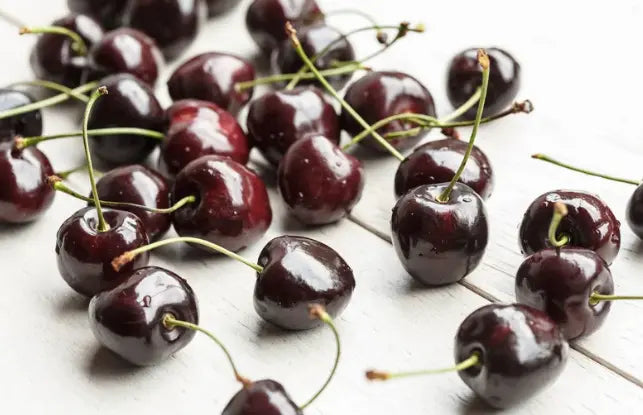-
Delivery from 10 plants to France, Switzerland and Europe
Delivery method -
Fruit Tree Wholesale Supplier
About Us -
Quality Fruit Tree Plants
Technical itinerary
Noire de Tartarie Cherry Stake Tree bare-root
Noire de Tartarie Cherry Stake Tree bare-root
The prices shown are our base prices for large volumes. Depending on the quantity ordered and the producers’ pricing scales, the rate may be adjusted upward. Each quote is personalized to ensure you receive a fair price.
Mini order 10 units / Multiple orders 10 units (FRS202412002)
Couldn't load pickup availability
 Buy now and get it delivered when you're ready to plant - Add your desired date to your quote request
Buy now and get it delivered when you're ready to plant - Add your desired date to your quote request
- Delivery from 10 plants to France, Switzerland and Europe

Technical sheet of the Black Tartarian Cherry variety
- Fruit Flesh Color: Dark purple juice, deliciously fragrant
- Skin color: Deep, almost entirely black
- Size and Shape: Medium sized
- Tree size: Robust and vigorous, cultivable in all regions of France, including at altitude
- Fruit maturity: Heart of the month July
- Fruit Taste: Sweet Flavor
- Earliness of the variety: Late
- Fruiting period: Late June to mid-July
- Disease Resistance and Storage: Disease resistant. The fruits are ready to eat as soon as they are picked, and it is essential to pick them when ripe for better storage.
- Variety yield: An adult tree (aged 10 to 20 years) can produce on average between 25 and 50 kilos of fruit per year
- Is this variety self-fertile? Although the variety is self-fertile, it is always recommended to plant a second cherry tree nearby to ensure optimal pollination and quality fruit production.
- Commercial Use: Widely used for making desserts and are also versatile due to their sweet flavor and texture
- Is this a COV variety? No, the Black Tartarian cherry variety is not a COV (Certificate of Origin and Quality) variety.
-
Comments:
- Originally from Russia
- The flowering is white and fragrant, adding an aesthetic touch to the garden
Quick read / the essentials on the Black Tartarian Cherry
The Black Tartarian Cherry is an old and late variety , known for its robustness, its resistance to diseases and its adaptation to cold climates and medium altitude areas . It produces black, sweet and fragrant fruits , very appreciated for fresh consumption as well as for processing into juices, jams and pastries . Arboriverse, a specialist wholesale supplier of cherry plants, offers this variety to producers wishing to diversify their offer and extend the cherry season .
This vigorous and productive tree flowers in April , reducing the risk of spring frosts. The late harvest, between late June and mid-July , allows growers to take advantage of a less saturated market . Buying Black Tartarian cherry plants from an expert like Arboriverse ensures successful cultivation and optimal yield .
Although it is sometimes described as partially self-fertile , it is recommended to associate compatible pollinators such as Géant d'Hedelfingen, Summit, Burlat, Kordia or Regina to ensure good fruiting . Arboriverse, a specialist wholesale supplier of cherry plants, supports producers in the choice of pollinator varieties and suitable rootstocks , such as Ceravium, Maxma 14 or Gisela , to optimize vigor and production .
With its good resistance to fungal diseases and pests , the Black Tartarian Cherry tree requires little maintenance . Annual pruning and controlled watering help maintain regular production and optimal fruit quality . Buying Black Tartarian Cherry plants from Arboriverse means investing in a reliable and profitable variety for professionals .
Introducing the Black Tartarian Cherry Tree
The Black Tartary cherry tree is an old variety originating from Russia , introduced to England and the United States at the end of the 18th century. This variety is distinguished by its robustness, its resistance to diseases and the quality of its fruits with black, sweet and fragrant flesh. Adapted to cold climates, it can be grown in France, including at high altitudes, and represents an interesting choice for producers looking for a quality late cherry.
General characteristics
The Black Tartarian cherry tree is a vigorous , semi-erect tree that can reach a height of 5 to 6 meters when mature. It flowers in April , which partially protects it from late frosts. Harvesting takes place between the end of June and mid-July , thus offering a late production that is appreciated on the market.
Its fruits are medium-sized , round , with black skin and very fragrant purple flesh . Their texture is firm and crunchy , while their flavor is intensely sweet , ideal for fresh consumption and processing into juices, jams and pastries .
Growing conditions
The Black Tartarian cherry tree adapts well to different types of soil , as long as they are well-drained . It can be planted on calcareous or clay-loam soils, with a neutral or slightly acidic pH. On the other hand, it fears root asphyxiation and should not be grown in overly wet soil.
This cherry tree is very hardy , able to withstand temperatures down to -20°C . It is particularly suited to cold regions and areas of medium altitude . A sunny exposure is recommended to ensure good ripening of the fruit.
Recommended rootstocks
For optimal cultivation in France, several rootstocks are suitable for the Black Tartarian cherry tree:
- Ceravium : Moderately dwarfing, it offers good disease resistance and is suitable for well-drained soils.
- Maxma 14 : Semi-dwarfing, it ensures rapid fruit set and good productivity.
- Gisela 6 : Ideal for intensive orchards, it allows early fruiting and abundant production .
The choice of rootstock depends on production objectives and local soil and climate conditions.
Pollination and yield
Although some sources mention possible self-fertility , the Black Tartarian cherry is generally self-sterile or partially self-sterile , requiring cross-pollination to ensure optimal production .
Recommended pollinator varieties are Hedelfingen Giant, Summit, Burlat, Kordia, Regina and Vignola , which bloom at the same time as the Black Tartary. To ensure effective pollination, it is advisable to plant one pollinator cherry tree for every 3 to 4 Black Tartary cherry trees .
Its average yield is 25 to 50 kg of fruit per tree per year when mature (10-20 years).
Resistance to diseases and parasites
The Black Tartary cherry tree is known for its good resistance to diseases , which makes it a reliable variety that requires few phytosanitary treatments. However, this resistance is not absolute , and monitoring is recommended to prevent certain diseases such as:
- Moniliosis : can be prevented by appropriate pruning and preventive treatments using Bordeaux mixture.
- Shot hole : fungal disease that can affect the foliage and requires preventive treatments in winter.
Regarding pests, this variety can be subject to attacks by black aphids (Myzus cerasi) . Regular monitoring and the use of biological treatments (beneficial insects, natural decoctions) can limit infestations.
Tree maintenance and management
The Black Tartarian cherry tree requires moderate maintenance to maximize its production and longevity:
- Annual pruning : after harvesting, it is advisable to aerate the tree by removing dead branches and thinning out the foliage.
- Reasonable watering : it tolerates dry periods but appreciates a water supply during the first years of growth.
- Balanced fertilization : favor moderate inputs of potash and phosphorus to improve fruiting, while avoiding excess nitrogen.
- Soil drainage : in heavy soil, adding gravel to the bottom of the planting hole is recommended to avoid root asphyxiation.
Commercial interest
The Black Tartary cherry tree offers several advantages for producers wishing to diversify their offering:
- Late production which allows it to reach the market after the early and intermediate varieties.
- Distinctive fruit with its intense black color and sweet taste, appreciated for fresh consumption and processed products.
- Good disease resistance reducing maintenance costs and limiting the use of chemical treatments.
- Adaptability to cold climates , allowing cultivation in areas where other cherry trees encounter difficulties.
Its main disadvantage is its need for a pollinator , which requires careful planning of the orchard.
Outlook for producers
The Black Tartary cherry tree represents an interesting option for diversifying an orchard by introducing a late-ripening, hardy variety well adapted to cold climates. Its high productivity , combined with its disease resistance, makes it a profitable choice for growers looking for a cherry with high commercial potential.
Exploring fruit processing methods (juice, jam, drying) could offer new opportunities for professionals wishing to maximize their value. It would also be relevant to study biological control strategies against aphids and fungal diseases , in order to optimize cultivation by limiting the use of phytosanitary treatments.
To summarize: Black Tartarian Cherry
The Black Tartarian Cherry is a late-ripening, hardy variety suited to cold climates , ideal for producers looking to diversify their offerings with late-season production . Its sweet, black fruit , with firm, juicy flesh , is particularly appreciated for fresh consumption and processing . Arboriverse, a specialist wholesale supplier of cherry plants, offers this variety to professionals wishing to optimize their yield and extend their harvest season .
This cherry tree adapts to different types of soil , as long as they are well-drained , and tolerates temperatures down to -20°C . Its late flowering protects it partly from spring frosts , and its harvest from late June to mid-July allows it to reach a less competitive market. Buying Black Tartarian cherry plants from Arboriverse guarantees abundant and regular production .
Thanks to its good disease resistance and low maintenance , this variety is a reliable and cost-effective option for growers. Arboriverse, a specialist wholesale supplier of cherry plants, helps professionals choose the most suitable varieties, pollinators and rootstocks for their orchards . Buying Black Tartarian cherry plants from an expert means choosing a high-quality late cherry and sustainable cultivation .
-
Noire de Tartarie Cherry Stake Tree bare-root
Regular price €18,00 EURRegular priceUnit price / per -
Noire de Tartarie Cherry Scion bare-root organic
Regular price €14,85 EURRegular priceUnit price / per -
Noire de Tartarie Cherry Scion bare-root
Regular price €11,40 EURRegular priceUnit price / per -
Noire de Tartarie Cherry Spindle Tree bare-root
Regular price €15,40 EURRegular priceUnit price / per -
Noire de Tartarie Cherry Half-Standard Tree 8-10 cm diameter bare-root
Regular price €23,70 EURRegular priceUnit price / per -
Noire de Tartarie Cherry Half-Standard Tree 6-8 cm diameter bare-root
Regular price €22,10 EURRegular priceUnit price / per



